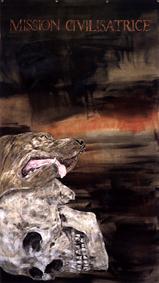 Leon Golub, Mission Civilisatrice, 1996, acrylic on linen, 92" x 51.5"
The mast comprehensive showing in Europe to date of the work of the distinguished American painter Leon Golub (b 1922) opens to the public at the Irish Museum of Modern Art an Wednesday 5 July. Leon Golub: Paintings 1950-2000 comprises 39 large-scale works and some 45 heads and political portraits and includes key paintings from all aspects of Golub's oeuvre. It ranges from the classically-inspired generic figures of the 1950s through the Vietnam, Mercenaries, Interrogation, Horsing Around and Riots series to important works from the 1990s, such as Try Burning This One, 1991; The Site, 1994, and The Blue Tatoo, 1998. The exhibition also includes the rarely seen Political Portraits, 1976-79. Taken from contemporary media photographs, they portray powerful figures of the day, including Richard Nixon, Ho Chi Minh and Francisco Franca. The exhibition is curated by Jon Bird, a noted authority an Golub's work. Leon Golub's work is about power and the recurring misuse of power through violence, not as an isolated inhuman phenomenon but as an expression of organised, often state-sponsored, oppression and brutality. A fundamental tension is at the heart of his paintings a tension literally between the figure and the ground of the canvas, between the individual and the group within a painting and also between the role of the artist and the wider background of society. Galub has described his work as "a definition of how power is demonstrated through the body and in human actions, and in our time, how power and stress and political and industrial powers are shown... I' m painting citizens of our society, but I'm putting them through certain kinds of experiences which have affected them. I can describe some of them - Dachau, Vietnam, autamatized war, I would even say such a phrase as Imperial America, in a way." In the Napalm series, produced in reaction to the war
in Vietnam, the body emerged as the symbot of conflict - the
centrat source of pain and distress. Jon Bird describes these,
and the Vietnam series of paintings, as depicting "not
a frozen moment in the heat of action but a sombre vision of
the casual acceptance of atrocity and death." The relationships
between white and
Born in Chicago in 1922, Leon Golub first came to prominence during the 1950s as part of the "Monster Roster", whose work depicted monsters and human I animal hybrids. It was at this time that he came to the realisation that, contrary to the tenets of the prevailing Abstract Expressionists, representation of actions and events is crucial in experiencing the modern world. From 1959 to 1964 he lived in Paris. In 1964 he, and his wife the artist Nancy Spero, moved to New York (where they continue to live and work). Golub and Spero were leading figures in activist artists' groups such as "Artists and Writers Protest Against the War in Vietnam" (1960s-70s) and "Artists Call Against American Intervention in Latin America" (1980s).
The Vietnam War enlarged his engagement with contemporary
social issues, a position at variance with most of his contemporaries.
As jon Bird has stated:
Selected works from the exhibition will travel to the South London Gallery in December 2000. The whole exhibition will then tour to the Albright Knox Gallery, Buffalo, USA (spring 2001), and the Brooklyn Museum of Art (summer 2001). |